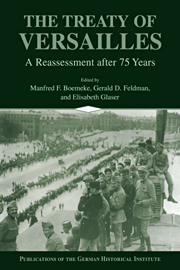Book contents
- Frontmatter
- Introduction
- Prologue: 1919-1945-1989
- PART ONE PEACE PLANNING AND THE ACTUALITIES OF THE ARMISTICE
- PART TWO THE PEACEMAKERS AND THEIR HOME FRONTS
- PART THREE THE RECONSTRUCTION OF EUROPE AND THE SETTLEMENT OF ACCOUNTS
- PART FOUR THE LEGACY AND CONSEQUENCES OF VERSAILLES
- PART FIVE ANTECEDENTS AND AFTERMATHS REFLECTIONS ON THE WAR-GUILT QUESTION AND THE SETTLEMENT
- Bibliography
- Index
Prologue: 1919-1945-1989
Published online by Cambridge University Press: 05 January 2013
- Frontmatter
- Introduction
- Prologue: 1919-1945-1989
- PART ONE PEACE PLANNING AND THE ACTUALITIES OF THE ARMISTICE
- PART TWO THE PEACEMAKERS AND THEIR HOME FRONTS
- PART THREE THE RECONSTRUCTION OF EUROPE AND THE SETTLEMENT OF ACCOUNTS
- PART FOUR THE LEGACY AND CONSEQUENCES OF VERSAILLES
- PART FIVE ANTECEDENTS AND AFTERMATHS REFLECTIONS ON THE WAR-GUILT QUESTION AND THE SETTLEMENT
- Bibliography
- Index
Summary
There have been three great wars in this century. Each concluded with hopes, even blueprints, for transcending ancient rivalries of states and peoples. In 1919, after World War I, came the Fourteen Points and the League of Nations. In 1945, after World War II, the world welcomed the United Nations and the principles of the Atlantic Charter. In 1989, which saw the end of the Cold War, the breaching of the Berlin Wall, and the crumbling of the communist bloc, there was neither treaty nor ceremony. But the air was filled with the heady promise of liberation. All of these promises are embodied in the vision of Woodrow Wilson: the prophet scorned, and now once again redeemed. Today, Wilsonianism is triumphant. Everywhere leaders pay obeisance to his vision. The principles he championed - democracy, collective security, self-determination - are extolled as the building blocks of a new world order (itself another Wilsonian construct). Wilson, having periodically been criticized as a dreamer or a failure, is once again hailed as a visionary whose ideals can light the way to a brighter future.
Although Wilson initially hoped to keep America out of the European war and as late as January 1917 was proposing a compromise peace, a “peace without victory” he also sought, as he said a few months later, a “right more precious than peace.” That right, he declared in his message to Congress, was “democracy, the right of those who submit to authority to have a voice in their own government, for the rights and liberties of small nations, and to make the world itself at last free.”
- Type
- Chapter
- Information
- The Treaty of VersaillesA Reassessment after 75 Years, pp. 21 - 34Publisher: Cambridge University PressPrint publication year: 1998
- 2
- Cited by



